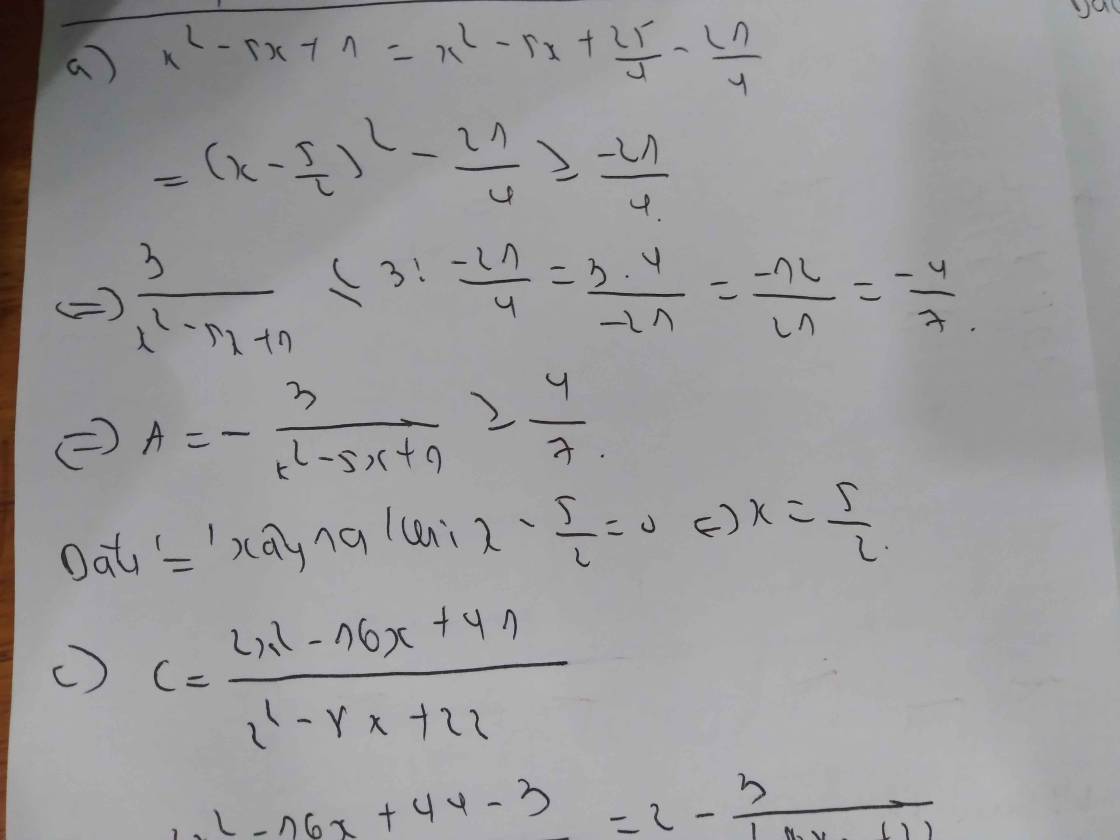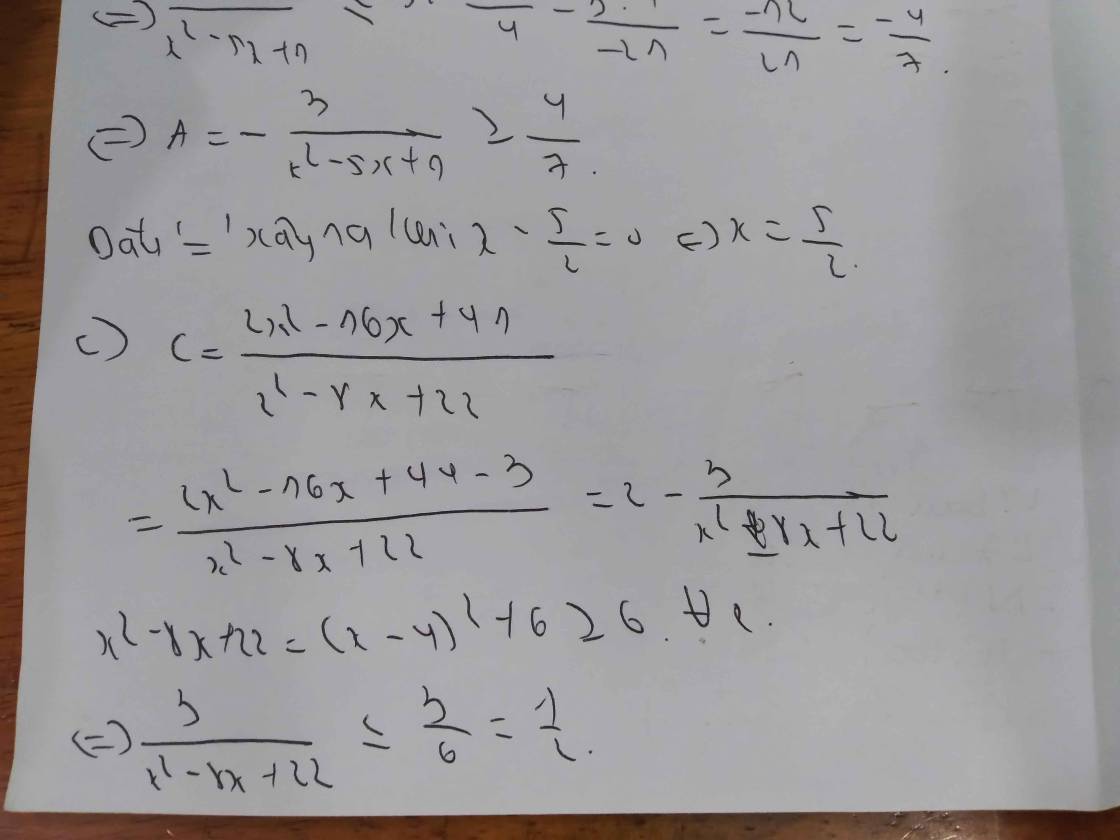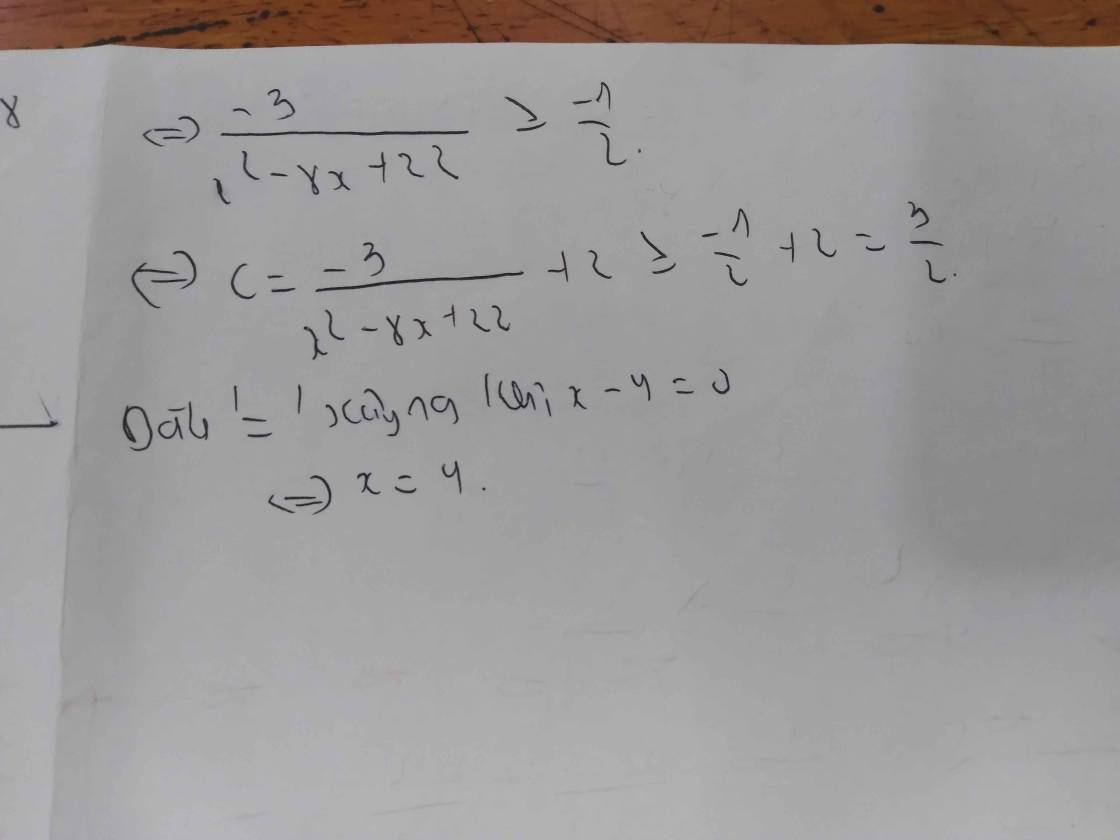tìm giá trị nhỏ nhất của biểu thức:
A=(2x-1)4+3
B=-(8x-\(\dfrac{4}{5}\))6+1
Hãy nhập câu hỏi của bạn vào đây, nếu là tài khoản VIP, bạn sẽ được ưu tiên trả lời.


\(A=2\left(x^2-4x+4\right)-7=2\left(x-2\right)^2-7\ge-7\)
Dấu \("="\Leftrightarrow x=2\)
\(B=\left(x^2+3x+\dfrac{9}{4}\right)-\dfrac{1}{4}=\left(x+\dfrac{3}{2}\right)^2-\dfrac{1}{4}\ge-\dfrac{1}{4}\)
Dấu \("="\Leftrightarrow x=-\dfrac{3}{2}\)
\(C=4\left(x^2-2x+1\right)-4=4\left(x-1\right)^2-4\ge-4\)
Dấu \("="\Leftrightarrow x=1\)
\(D=\dfrac{1}{-\left(x^2+2x+1\right)+6}=\dfrac{1}{-\left(x+1\right)^2+6}\ge\dfrac{1}{6}\)
Dấu \("="\Leftrightarrow x=-1\)
1.
$A=2x^2-8x+1=2(x^2-4x+4)-7=2(x-2)^2-7$
Vì $(x-2)^2\geq 0$ với mọi $x\in\mathbb{R}$
$\Rightarrow A\geq 2.0-7=-7$
Vậy $A_{\min}=-7$ khi $x-2=0\Leftrightarrow x=2$
2.
$B=x^2+3x+2=(x^2+3x+1,5^2)-0,25=(x+1,5)^2-0,25\geq 0-0,25=-0,25$
Vậy $B_{\min}=-0,25$ khi $x=-1,5$
3.
$C=4x^2-8x=(4x^2-8x+4)-4=(2x-2)^2-4\geq 0-4=-4$
Vậy $C_{\min}=-4$ khi $2x-2=0\Leftrightarrow x=1$
4. Để $D_{\min}$ thì $5-x^2-2x$ là số thực âm lớn nhất
Mà không tồn tại số thực âm lớn nhất nên không tồn tại $x$ để $D_{\min}$

A\(=2x^2-8x+1\)
=2x(x-4)+1≥1
Min A=1 ⇔x=4
B=\(x^2+3x+2\)
\(=\left(x^2+2.x.\dfrac{3}{2}+\dfrac{9}{4}\right)-\dfrac{1}{4}\)
\(=\left(x+\dfrac{3}{2}\right)^2-\dfrac{1}{4}\)≥\(-\dfrac{1}{4}\)
Min B=-1/4⇔x=-3/2

\(A=2x^2+4x+1=2\left(x^2+2x+1\right)-1=2\left(x+1\right)^2-1\ge-1\)
\(A_{min}=-1\) khi \(x=-1\)
Câu B chỉ có max, ko có min
\(B=-x^2+3x+4=-\left(x^2-3x+\dfrac{9}{4}\right)+\dfrac{25}{4}=-\left(x-\dfrac{3}{2}\right)^2+\dfrac{25}{4}\le\dfrac{25}{4}\)
\(B_{max}=\dfrac{25}{4}\) khi \(x=\dfrac{3}{2}\)
Câu C cũng chỉ có max, không có min
\(C=-4x^2+8x=-4\left(x^2-2x+1\right)+4=-4\left(x-1\right)^2+4\le4\)
\(C_{max}=4\) khi \(x=1\)
Câu D cũng chỉ có max, không có min
\(D=\dfrac{3}{4x^2-4x+1+4}=\dfrac{3}{\left(2x-1\right)^2+4}\le\dfrac{3}{4}\)
\(C_{max}=\dfrac{3}{4}\) khi \(x=\dfrac{1}{2}\)
(4 câu có 3 câu sai đề)
Nhầm đề bài Sorrry
đáng lẽ là ntn này giúp con dc ko ạ
\(\dfrac{3}{4x^{2_-}4x+5}\) Giúp con :(

a: Để \(\dfrac{3x-2}{4}\) không nhỏ hơn \(\dfrac{3x+3}{6}\) thì \(\dfrac{3x-2}{4}>=\dfrac{3x+3}{6}\)
=>\(\dfrac{6\left(3x-2\right)}{24}>=\dfrac{4\left(3x+3\right)}{24}\)
=>18x-12>=12x+12
=>6x>=24
=>x>=4
b: Để \(\left(x+1\right)^2\) nhỏ hơn \(\left(x-1\right)^2\) thì \(\left(x+1\right)^2< \left(x-1\right)^2\)
=>\(x^2+2x+1< x^2-2x+1\)
=>4x<0
=>x<0
c: Để \(\dfrac{2x-3}{35}+\dfrac{x\left(x-2\right)}{7}\) không lớn hơn \(\dfrac{x^2}{7}-\dfrac{2x-3}{5}\) thì
\(\dfrac{2x-3}{35}+\dfrac{x\left(x-2\right)}{7}< =\dfrac{x^2}{7}-\dfrac{2x-3}{5}\)
=>\(\dfrac{2x-3+5x\left(x-2\right)}{35}< =\dfrac{5x^2-7\cdot\left(2x-3\right)}{35}\)
=>\(2x-3+5x^2-10x< =5x^2-14x+21\)
=>-8x-3<=-14x+21
=>6x<=24
=>x<=4

1) \(A=x^2+4\ge4\)
\(ĐTXR\Leftrightarrow x=0\)
2) \(B=2x^2-\dfrac{3}{2}\ge-\dfrac{3}{2}\)
\(ĐTXR\Leftrightarrow x=0\)
3) \(\left(2x-3\right)^2-5\ge-5\)
\(ĐTXR\Leftrightarrow x=\dfrac{3}{2}\)




\(A=\left(2x-1\right)^4+3\)
mà \(\left(2x-1\right)^4\ge0,\forall x\)
\(\Rightarrow A=\left(2x-1\right)^4+3\ge0+3=3\)
\(\Rightarrow GTNN\left(A\right)=3\left(x=\dfrac{1}{2}\right)\)
\(B=-\left(8x-\dfrac{4}{5}\right)^6+1\)
mà \(-\left(8x-\dfrac{4}{5}\right)^6\le0,\forall x\)
\(\Rightarrow B=-\left(8x-\dfrac{4}{5}\right)^6+1\le0+1=1\)
\(\Rightarrow GTLN\left(B\right)=1\left(x=\dfrac{1}{10}\right)\)